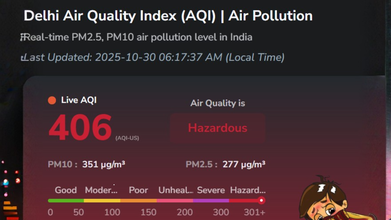- Health Conditions A-Z
- Health & Wellness
- Nutrition
- Fitness
- Health News
- Ayurveda
- Videos
- Medicine A-Z
- Parenting
- Web Stories
CDC No Longer Recommends COVID Vaccine For Kids And Pregnant Women - What Do Experts Think?

(Credit-Canva)
The U.S. federal government has recently removed COVID-19 vaccines from the recommended list for healthy pregnant women and children. In an X post, the US health Secretary Robert F. Kennedy Jr., said that the Centers of Disease Control and Prevention (CDC) no longer recommends vaccine for “healthy children and healthy pregnant women”. He explains that the official stated that this decision gets the country "one step closer" to ‘Making America Healthy Again’.
To understand the implications of this, we spoke with experts, Dr. Shrey Srivastav, Consultant Physician at Sharda Hospital, and Dr. Arunesh Kumar, Director & HOD, Pulmonology, Paras Health who clarified some common concerns people were experiencing.
What This Means for Access to Vaccines
Dr. Srivastav points out that while the US may not recommend vaccines any longer, the World Health Organization (WHO), still advises vaccination for pregnant women. A few healthcare professionals have brought up their concerns regarding COVID vaccines, stating they do not think it is necessary to get COVID vaccines at the moment.
Dr. Srivastav adds that COVID vaccine is more important for pregnant women with co-morbidities, whether diabetes, hypertension, immuno-compromised or with pre-existing health concerns need the vaccine. Dr. Arunesh also points out the same, encouraging people to get vaccinated for COVID in case they have any such pre-existing conditions. However, Dr Sushila Kataria, Senior Director, Internal Medicine Medanta recommends people should wait for official recommendations from the government before getting vaccinated.
Also Read: Female Cancer Crisis On An Increase, Climate Change Could Be Responsible
RFK Jr. explained that the previous administration had pushed for more COVID shots for healthy children without enough clear data to support repeated booster shots for kids. This decision was made alongside other health officials. Food and Drug Administration Commissioner (FDA) Dr. Martin Makary and National Institutes of Health (NIH) Director Dr. Jay Bhattacharya, who called it "common sense" and "good science," noted that there's no evidence that healthy children currently need the vaccine.
Dr. Srivastav points out that there are many reviews and studies that say otherwise. “In my views many people still have doubts about COVID-19 vaccines for children. However, large studies published in PubMed and other indexed journals have shown that mRNA vaccines are safe and work well for kids aged 5 to 11.”
He continues to explain that for children aged 6 months to 4 years who have weakened immune systems, it's important that all their COVID-19 vaccine shots come from the same company, following the CDC's advice. This particular study was published in 2023 JAMA network, Dr. Srivastav explains the study, “10 million vaccinated children found fewer COVID infections, fewer symptoms, fewer hospital stays, and fewer cases of MIS-C. Mild side effects like sore arms and fever were common, but serious problems like heart inflammation were very rare.”
Is There Enough Evidence Supporting Vaccines?
“Yes, extensive research and monitoring have shown that COVID vaccines are safe for both healthy children and pregnant women.” Dr Arunesh explains that vaccines act as an extra protective shield, “In pregnancy, vaccination helps prevent severe illness and can also pass protective antibodies to the baby. For children, the side effects are typically mild and short-lived, such as arm soreness or fatigue.”
Before this change, the government had been recommending COVID-19 vaccines for almost everyone, including children and pregnant people. According to the Mayo Clinic even though children usually don't get very sick from COVID, some, especially very young ones, can. They also expressed how pregnancy increases the risk of severe COVID-19.
Dr. Srivastav added that research backs the safety and effectiveness of vaccines for pregnant women. “Research shows that COVID-19 vaccines are safe and effective for pregnant women. A large review of over 600,000 pregnant women found that getting vaccinated did not increase the risk of miscarriage, early birth, or stillbirth. In fact, vaccinated pregnant women were less likely to get COVID-19 or need hospital care because of it.”
Delhi Air Pollution: Damage Risks Are Beyond Your Lungs, It Can Affect Your Kidney Too, According To Doctor

Credits: AQI.in
As of 6.17am on October 30, 2025, the AQI in Delhi is recorded at 406, and falls under the category 'Hazardous'. Major pollutants are PM2.5, PM10, CO, So2, No2, and O3. We have long known air pollution's impact on respiratory health and lungs, however, it is beyond that. With levels as high as 'hazardous', the pollution could also damage our kidneys.
Dr Sanjeev Gulati, nephrologist in Fortis, Delhi, writes that the detrimental effects of air pollution are not only evident in the respiratory and circulatory system, but it can also extend to renal function. He writes, "The kidneys are particularly vulnerable to the toxic effects of environmental pollutants due to their critical role in filtration. Environmental and occupational exposure to pollutants remains a common cause of kidney disease globally, especially in developing countries."
Up to 22% of the global disease burden and 23% of deaths are attributed to environmental pollution. There have been various studies that show the long-term exposure from particulate matter and how it is linked to an increased risk of membranous nephropathy and decline in renal function.
What Is Membranous Nephropathy?
It is a kidney disease caused by the damage to the kidney's filtration system. This could lead to significant protein leakage into the urine. This could happen due to the PM exposure.
In fact, a 2025 study published in the Journal of the American Society of Nephrology highlighted the role of air pollution in the rising risk of new kidney diseases. The study was able to track 2.5 million veterans, who were free of kidney diseases in 2003 and 2004, over an average of 8.5 years. The researchers then compared their health outcomes to air pollution levels. The study then found that for every 10 microgram increase in pollution per cubic meter of air, there was a 25 to 37% increase in new kidney disease case, a 36% rise in rapid kidney function decline, and a 31% increase in the risk of kidney failure requiring dialysis.
How Does Pollution Damage Your Kidney?
Dr Sean Hashmi, MD, MS, FASN, a board-certified nephrologist and obesity medicine specialist in the Southern Carolina, US, in a video on his YouTube channel that he uploaded to explain the impact of air pollution on kidney says, "your kidney is force to process a chemical soup day after day after day. And the main villain here is PM2.5."
Dr Hashmi notes that once the PM2.5 is in your bloodstream, your body treats them like foreign invaders. "This triggers powerful inflammation throughout your system. Inflammation is your immune system's response to injury and threat. However, when inflammation becomes chronic [due to long exposure of PM2.5], it can damage healthy tissues."
He says, as a result, these particle-filled blood arrives in your kidney. "Your kidneys have millions of tiny filters glomerulus, they are like cluster of blood vessels that act like coffee filters for your blood. The constant flow of abrasive particles creates low-grade sand blasting on these fragile filters. Over years this leads to permanent scarring and reduced kidney functions."
A Mysterious New Fungal Infection Is Spreading In UK Hospitals, Health Expert Warns

Credits: Canva
Health officials across the UK are on alert after identifying a new fungal infection spreading in hospitals. Known as Candidozyma auris (C. auris), this yeast has been named a critical priority pathogen by the World Health Organisation (WHO) because of its growing resistance to treatment and potential danger to vulnerable patients. The UK Health Security Agency (UKHSA) is now working with NHS England and other health partners to monitor rising detections of C. auris, which until recently had been rare in the country. Globally, the infection has been linked to a high death rate, raising concern for hospitalised patients with weakened immune systems.
What Is Candidozyma Auris?
C. auris is a type of fungus that can lead to severe infections, particularly among those who are already ill. Some strains have shown resistance to multiple antifungal drugs, making treatment difficult. It spreads most often in hospitals and long-term care facilities. According to the Cleveland Clinic, infections may include:- Ear infections
- Wound infections
- Urinary tract infections (UTIs)
- Bloodstream infections that can spread throughout the body
Unlike other Candida species, C. auris does not typically live naturally on the body. People usually contract it from contaminated hospital surfaces or from someone who already has the infection. For healthy individuals, the risk of infection remains low.
How Common Are Candidozyma Auris Infections?
C. auris remains uncommon but is considered an emerging infectious disease due to the rising number of reported cases since 2019. Healthcare professionals are increasing infection-control measures to contain its spread in hospitals and care homes.Symptoms Of Candidozyma Auris
The symptoms vary depending on which part of the body is infected. Common signs include:- Fever
- Chills
- Fatigue or extreme tiredness
- Low blood pressure
- Rapid heartbeat (tachycardia)
- Low body temperature (hypothermia)
- Ear pain, pressure, or a sense of fullness (in ear infections)
According to a UKHSA statement, C. auris was first discovered in 2009 in the ear of a patient in Japan and has since been detected in over 40 countries across six continents. The agency explains that the fungus is particularly concerning because it can survive for long periods on surfaces—even in hospital settings—and is often resistant to both standard medical treatments and disinfectants.
Since 2015, several long-lasting outbreaks of C. auris have occurred in UK hospitals, requiring intensive control measures to stop further transmission. Peaks in cases have mostly been linked to these outbreaks.
Can Candidozyma Auris Be Cured?
C. auris infections can often be treated with a type of antifungal medication called echinocandins. However, certain strains are developing resistance, making them more difficult to cure. In such cases, doctors may need to combine different drugs to eliminate the infection. Before starting any medication, it is important to consult a qualified healthcare professional for proper diagnosis and treatment advice.
Delhi’s Artificial Rain Plan To Fight Toxic Smog Fails— Here’s Why It Didn’t Work

Credits: PTI
Artificial Cloud Seeding Delhi: Delhi has long struggled with toxic air. The city often records high pollution levels throughout the year, and in an effort to provide cleaner air to residents, the Delhi government has been exploring cloud seeding or artificial rain for several months.
After more than five decades, Delhi finally carried out cloud seeding trials to trigger artificial rain and bring down rising pollution levels. The project was a joint effort between the Delhi government and the Indian Institute of Technology (IIT) Kanpur, conducted in areas such as Burari, Karol Bagh, Mayur Vihar, and Badli.
However, the experiment failed, as the India Meteorological Department (IMD) did not record any rainfall in the city.
Why Cloud Seeding Failed in Delhi?
According to an NDTV report, IIT Kanpur Director Manindra Agrawal said the attempt was “not completely successful” because the clouds did not have enough moisture. “For rain to form, moisture levels of at least 50 percent are ideal,” he said. “Today’s clouds only had about 15–20 percent moisture, which reduced the chances of rainfall.”
Despite the low humidity, Agrawal said the exercise gave researchers valuable experience and confidence that the method could work under more favorable conditions. While Delhi saw no rainfall, small traces were recorded in Noida (0.1 mm) and Greater Noida (0.2 mm). Two more flights will be carried out once suitable clouds appear.
A report released by the Delhi government on Tuesday evening showed a slight drop in pollution levels in areas where the seeding took place. According to PTI, PM2.5 levels fell marginally in Mayur Vihar, Karol Bagh, and Burari. Environment Minister Manjinder Singh Sirsa called it a “major scientific step” in tackling air pollution and said more trials, possibly up to 10, will be conducted until February if the results remain encouraging.
What Is Cloud Seeding?
Cloud seeding involves adding substances like silver iodide or dry ice to clouds to encourage rainfall or snowfall, reduce hail, or clear fog. It can be carried out using aircraft, rockets, or ground-based equipment.
The formula developed by IIT Kanpur includes silver iodide nanoparticles, iodised salt, and rock salt. These particles act as ice nuclei, helping moisture in the clouds condense and form rain. However, the process depends heavily on having the right level of humidity and moisture in the atmosphere.
Will a Third Round of Cloud Seeding Take Place?
A third round of trials is likely later this week, depending on IMD confirmation of suitable cloud conditions. Similar operations are expected in the coming days. Sirsa told ANI that IIT Kanpur has been collecting large-scale samples during the experiments and will submit a detailed report soon.
Globally, cloud seeding has produced mixed outcomes. China has reported success with using rockets, cannons, and drones to manage rainfall, including before the Olympics. In contrast, the United Arab Emirates faced criticism after last year’s floods in Dubai, raising questions about the method’s safety and reliability.
© 2024 Bennett, Coleman & Company Limited

